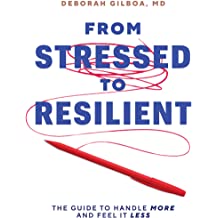 Our lives are filled with change and all change is stressful whether that change is good or bad. Whether stress takes a toll on our well-being or whether we use that stress to build resilience is determined partly by a set of skills that need to be practiced and refined. In From Stressed to Resilient: The Guide to Handle More and Feel it Less, Deborah Gilboa (Dr. G) has written an easy-to-follow workbook that enables the reader to build resilience.
Our lives are filled with change and all change is stressful whether that change is good or bad. Whether stress takes a toll on our well-being or whether we use that stress to build resilience is determined partly by a set of skills that need to be practiced and refined. In From Stressed to Resilient: The Guide to Handle More and Feel it Less, Deborah Gilboa (Dr. G) has written an easy-to-follow workbook that enables the reader to build resilience.
The book is a dynamic, personalized instruction book for building and working on our resilience. It begins by putting forward a particular mindset toward stress: feelings of stress are our brains’ way of interpreting change; stress is an integral part of living and adapting. The goal of the book is not to reduce stress but to transform how we prepare for and react to feelings of stress, utilizing stress to make us strong. The early chapters help us understand the landscape of our own beliefs and reactions to stress and where some of the opportunities for social-emotional development are in our lives. The useful questionaries guide this process helping us determine what should be a priority when reading the book. But don’t take these questionaries as determinative of who you are. They take stock of you at the moment, so I found it useful to return to them regularly.
The remainder of the book is a series of exercises for which there is a useful set of accompanying PDFs and online resources. These subsequent eight sections target specific skills leading to resilience: building connections, setting boundaries, being open to change, managing discomfort, setting goals, finding options, taking action, and persevering. Each of these has multiple practices and avenues for development giving you ownership of your own growth.
For those of us that feel a sense of “just tell me what to do,” this book walks you through steps in an easy-to-follow way and the author’s humor and forthright analysis allow you to put all your energy into the necessary self-reflection the book invites. The process is deceptively simple but enables the reader to learn and grow in small measurable steps. This is not the type of book that you read cover to cover but you read it strategically, guided by the information in the early chapters but also by our changing life goals. I also often repeated the useful exercises as I saw fit and reread old responses to gain insight into my development. While some of the books I have reviewed here are research-heavy and academic theory-laden, this is truly a book for guided self-improvement.
I advise integrating the book somehow into your daily routine while you work through it. I found it useful to integrate the reflective exercises into my morning routine right after I woke. These positioned me well to frame learning from the previous day and reframe the stresses present in my mind when I woke. Each section also has some practices to follow throughout the day from questions to ask others in conversations to imagining contingency plans or rescheduling missed opportunities. These practices then can frame the day; small goals that bring awareness to daily work and personal practice. Overall, the book will help you live life a little more mindfully and with purpose.
But the book does not end with you. The book is entirely adaptable for a variety of contexts, and I could easily see these exercises being pulled out for classroom practice, college student self-reflection, and teacher professional development, I even found it fun to practice some of the exercises with friends and family. The fact that they are already in worksheet format also makes it easy to scale them up for more than one person.
This book is not an intellectually heavy lift, and thank goodness, because we don’t need to add more to our plate when we are trying to self-improve. The book is not an added challenge but facilitates the process of building a stronger more resilient version of yourself.



